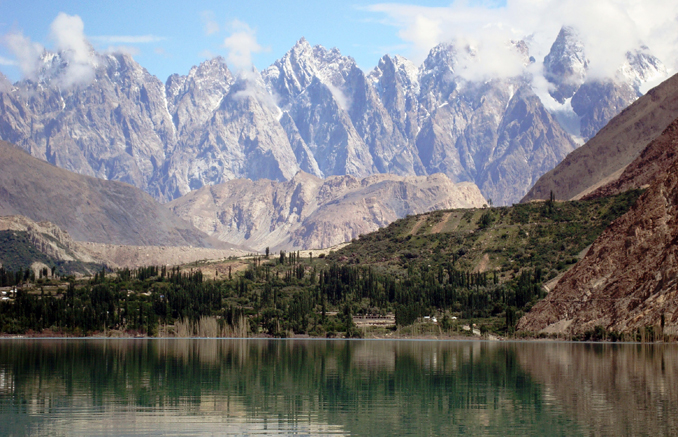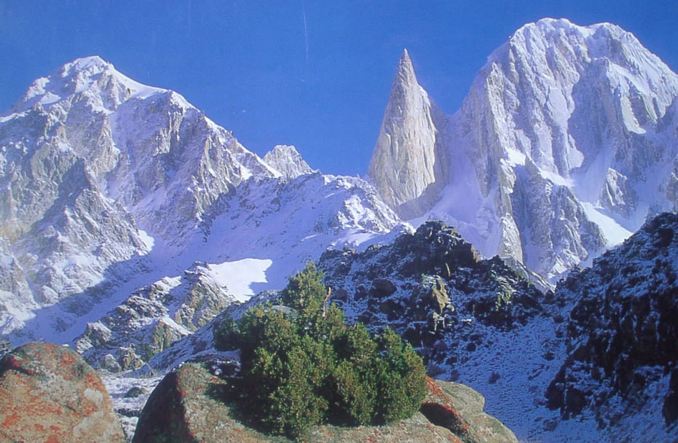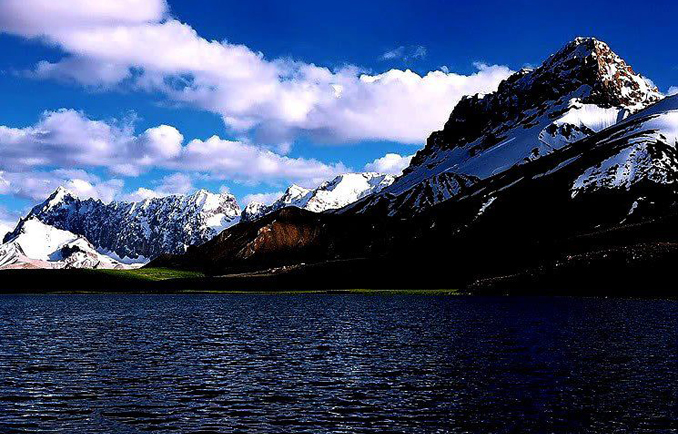Written by: Omer Qayyum and Amna Javed
Posted on: February 06, 2015 | 
Hunza Valley
Continuing our journey along the Economic Corridor, this week we explore the magnificent Hunza Valley. With respect to its natural beauty, varied seasons, juicy fruits, high mountain peaks and spectacular water streams, Hunza Valley is one of the most popular tourist destinations in Pakistan.
The light breeze, humming through poplar trees, and the sight of wheat fields carpeting the mighty, mountainous landscape is enough to overwhelm the visitor’s senses. Glittering with fragrant flowers, set against the backdrop of snow-covered mountains, the valley can be compared to a garden from heaven. The spectacular sunrise, showcasing a panoramic dance of light and shadows on the surrounding mountain ranges, is a sheer delight for the tourists. Along with the picturesque view from the valley, the seasonal fruits and the tasty cuisine also attract travellers.
 |
The stunning Baltit Fort is one the most admired tourist attractions in Hunza. The oldest part of the fort dates back to the 13th Century, when the Fort established itself as the prime seat for power in the state of Hunza. The fort was renovated and reopened in 1997. From its top, tourists can enjoy a bird’s eye view of the surrounding valley. Behind the fort is the mighty Ultar Peak, while at its fore is the Hunza River, Rakaposhi Mountain, the Golden Peak and the Broad Peak. The old heritage that is part of the Valley needs to be preserved so that more tourists can be lured into the area. For trekking enthusiasts, Rakaposhi Mountain is the easiest to climb. The Royal Geographical Society of London carried out a survey to determine a restoration plan for the Fort, which was then initiated and supported by Agha Khan Trust for Culture Historic Cities Support Program. The fort was renovated and reopened for tourists in 1997, and is now run by Baltit Heritage Trust.
Another noticeable feature of Hunza Valley is its irrigation canals that bring melted glacier water to the terraced fields and local villages. Tourists are able to spot fruit orchards spread over miles. Grown on precarious slopes, the true potential of these fruit trees remains unexplored as of now. The area that comprises the Valley is also suitable for cultivating potatoes, barley, wheat and vegetables along with apricots, apples, cherries and almonds. Utilizing modern farming methods and equipping local farmers with proper tools for cultivation can significantly increase the yield from these crops. In addition to that, instead of moving goods from Southern Punjab to China, the produce from this region can be exported.
 |
Moreover, there is immense potential for developing the Hotel Industry in Hunza as the exceptionally high number of tourists has to be catered to. Furthermore, the valley boasts a remarkably high literacy rate. In comparison to Pakistan’s literacy rate of 69%, it is estimated that the literacy rate in Hunza is more than 80%. Agha Khan III, Sir Sultan Muhammad Shah, was a keen advocate for providing quality education to everyone. The Agha Khan family undertook several initiatives to ensure that the local population, especially girls, have access to education at the primary and higher secondary levels. Later on, in collaboration with the Pakistan Government, community schools were also established in Hunza. Keeping the large, educated population in view, keeping this aspect in view, there is tremendous potential for the development of small IT businesses and E-commerce. With the provision of advanced telecommunication network, a number of educated youth can be provided the opportunity to contribute towards the economic development of the area. They would also be able to take up content writing and data entry jobs that are outsourced.
Besides the Hunza Valley, the nearby Shimshal Valley is also worth visiting. To reach the Valley, tourists are required to cross the river via cable bridges. The ride across the river is dangerous, yet fascinating and adventurous. The locals have built the cable bridge to transport people and luggage across the river. Geologically, Shimshal boasts a unique cluster of numerous high peaks, beautiful glaciers, green meadows and fertile land, and is known to be the largest glaciated region outside the Polar Regions. This valley is also a famous destination for hunting the blue sheep. Tourists can also indulge in fishing at Hunza lake or go for boating towards Borat lake.
 |
Shimshal Valley |
There are tremendous opportunities in the region that can be exploited to boost tourism and economic activity in the region. However, the authorities need to pay keen attention towards preserving the natural beauty of the Valley as the influx of tourists and travellers may cause environmental damage. The foremost initiative that they must take in this regard is the establishment of an effective solid-waste management system. A community based Solid Waste Management system has been initiated by Hunza Environmental Committee; however, the program needs to be patronized by the government to ensure its sustainability.
You may also like: